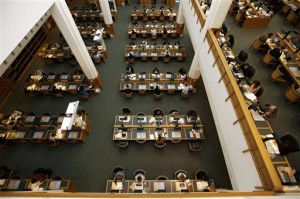
Knowledge at the tip of our fingertips. Some 250,000 books will be made available online in a deal between Google and the British Library. The agreement, announced Monday, will let Internet users read, search, download and copy thousands of texts published between 1700 and 1870. (AP Photo)
LONDON — A treatise on a stuffed hippopotamus, an 18th-century English primer for Danish sailors and a description of the first engine-driven submarine are among 250,000 books to be made available online in a deal between Google and the British Library.
The agreement, announced Monday, will let Internet users read, search, download and copy thousands of texts published between 1700 and 1870.
It is a small step toward the library’s goal of making the bulk of its 14 million books and 1 million periodicals available in digital form by 2020.
“So far we have only been able to digitize quite a small fraction of the global collection,” said the library’s chief executive, Lynne Brindley. “There is a long way to go.”
The deal marks another step in Google’s effort to make digital copies of the world’s estimated 130 million books. The company, based in Mountain View, California, touts the ambitious project as a way to enable anyone with an Internet connection to tap in a vast reservoir of knowledge. Google, though, stands to make more money if it can build the world’s biggest digital library.
By stockpiling millions of books that can’t be easily found elsewhere, Google gives people another reason to use its search engine, which already processes about two out of every three queries on the Web. Generating more search requests gives Google more opportunities to show ads that bring in revenue each they are clicked upon.
“Having richer content means people around the world are searching more for it, and that is good for our business,” said Peter Barron, Google’s European spokesman. He declined to say how much the project would cost, beyond describing it as “a substantial sum.” The books will be available on the websites of the British Library and Google Books.
Google has scanned more than 15 million books into its search index during the past seven years, but has only been able to show snippets of many of them because of copyright restrictions. The company tried to remove the U.S. copyright obstacles in a settlement of a class action lawsuit with authors and publishers only to have the agreement rejected by a federal judge three months ago.
The books that Google will be scanning from the British library are no longer protected by copyrights.
The deal with Google, which will see 40 million pages digitized over the next three years, will offer online researchers a selection of rarely seen works from an era of social, political, scientific and technological change that took in the Enlightenment, the Industrial Revolution and the American war of independence.
The books range from Georges Louis Leclerc’s “Natural History of the Hippopotamus, or River-Horse” — which includes a description of a stuffed animal owned by the Prince of Orange — to the 1858 work “A Scheme for Underwater Seafaring,” describing the first combustion engine-driven submarine.
The books are more than scholarly curiosities. British Library curator Kristian Jensen said an 18th-century guide to English for Danish mariners shows “how English began to emerge from being the language spoken by people over there on that island” to become the world’s dominant tongue.
Last year, the British Library announced plans to digitize up to 40 million pages of newspapers dating back three-and-a-half centuries, and it recently made thousands of 19th-century books digitized in a deal with Microsoft available as an app for iPhone and iPad devices.